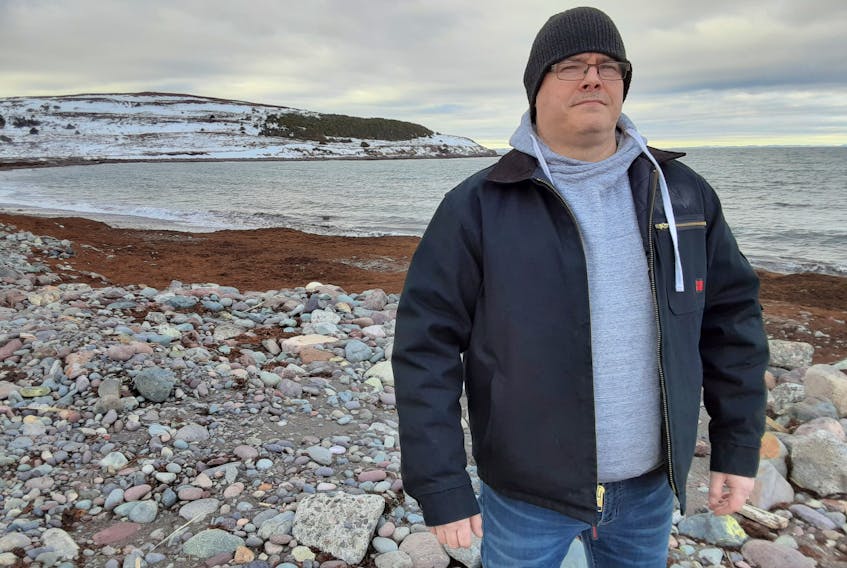Content warning: This article has subject matter that may be disturbing to some.
Dave Noseworthy thought he was doing the right thing when he spoke to a mental-health specialist three years ago.
Talking about mental illness can be still be taboo, discussed often in whispers, with derogatory words tossed around carelessly, though some strides have certainly been made.
Media coverage is more common than it once was, and corporations and advocacy groups promote awareness through campaigns like Bell Canada's annual Let’s Talk Day.
So Noseworthy felt encouraged to seek assistance.
His experience has not been positive, however.
“I went to get help and I ended up in a darker place, with more shame,” he told The Telegram recently.

Feeling like a failure
The 49-year-old said his mental-health struggles date back about a decade.
After opening a business in Grand Bank that didn’t work out, he took a course in concrete and was hired on at Bull Arm in 2014. He was hopeful his future was set, but the job lasted six weeks and he was laid off. No more work materialized.
“I had all my eggs in one basket and it never panned out."
That Christmas, things started to get “really dark,” Noseworthy said.
“I don’t know … I just didn’t feel like a man,” he explained.
He couldn’t find work, and his age bothered him. He saw young people building successful lives and had feelings of regret about his own youth.
“I had all my eggs in one basket and it never panned out." — Dave Noseworthy
“All this started exploding in my brain, basically,” he said.
He began having panic attacks, hand sweats and problems breathing.
His wife, Dawn, convinced him to see a doctor about his depression, and he was prescribed an anxiety medication.
The feelings persisted.
One day, he scared himself after he put a belt around his neck in the bathroom and jumped. Part of the belt got caught and he nearly suffocated.
Noseworthy said he has often heard stories of people who have killed themselves that way, and when they were found, it looked as if they were trying to save themselves.
“I do know what that feels like,” he said.
Referred to a specialist
Around mid-2015, Noseworthy was referred to a specialist in Marystown and put on a wait list.
A few months later, his employment outlook brightened, and he was hired on a casual call-in basis at a fish plant in the region. Less than a year later, he was working full-time.
“I trained on everything and then I applied for whatever came up so I’d always have a job, and then I was always useful. I could do anything. I made sure I could do anything so I’d always have something to do.”
Noseworthy was happy to be working, but still struggled with negative thoughts.
“Just stuff that shouldn’t have ever been bothering me was just eating, was just eating,” he said.
“I couldn’t even concentrate on work the way I wanted to. It was hard. My mind just wasn’t on it.”
It had been so long since he had been put on the waiting list to see a specialist, he thought he must have been overlooked.
Finally, he got a call.
“They said, ‘Do you still want to see the health-care specialist?’” he said.
In May 2018, nearly three years after his referral, Noseworthy had his first appointment with the specialist.
It was also the last time he worked at the fish plant.
Newfoundland and Labrador's Mental Health Crisis Line is available 24/7: 709-737-4668 or 1-888-737-4668.
Unsuitable options
In assessing Noseworthy’s medication, the doctor asked why he had been prescribed 15 sleeping pills a month. Noseworthy explained he took the pills every second week to adjust to a routine change in his work schedule between days and nights.
Noseworthy said he was taken off the pills and given a note for work saying he needed to be put on a regular schedule.
The options given to him were unsuitable, Noseworthy says; either he could quit his full-time job and return to the casual call-in list or he could approach a colleague about switching shifts. The latter meant working all nights and rarely seeing his wife and daughter.
Noseworthy’s doctor took him off work.
“I was crying in the office. I was upset. I didn’t want to lose my job, and it was just stressing me because I wanted help, but at the same time, I didn’t want extra stress, which this was causing already."
After several months, Noseworthy said, the specialist felt he could go back to work on his day shifts.
“You've got to be dead for them to care, for them to believe that there was actually trouble." — Noseworthy
He dropped the doctor’s letter off, but working only days apparently wasn’t possible.
“That’s what I was told by my union rep — if you can’t work nights, you’re ‘useless,’” Noseworthy recalls.
He says he was treated badly, and he remains in limbo with the company.
“Why go see the doctor, is my question? Why go see him? Why tell people there’s help?”
Noseworthy says there is still far more talk than action when it comes to mental health.
He's been posting on Facebook about his situation and his feelings about society’s attitude toward mental health.
“Family is very unimportant,” he said. “What makes family important is, you got to sacrifice and not see your family and make money. That’s what family is, but that’s not what family is.”
People will “like” a picture of someone who has died by suicide, but when a person talks about their problems, it’s like no one really seriously cares, he said.
“You've got to be dead for them to care, for them to believe that there was actually trouble,” he said.
Feeling low, stressed, or anxious? BounceBack is a free self-help program available in NL. Learn ways to overcome...
Posted by Canadian Mental Health Association NL on Wednesday, March 3, 2021
Big spike
Paul Fifield, acting CEO of the Newfoundland and Labrador branch of the Canadian Mental Health Association (CMHA), said there has been a big spike in people and workplaces looking for mental-health services in recent years.
“It is a positive thing to see more uptake, but again we’re still a long ways to go until (mental health is) seen, I’ll say, as on par with physical health,” he said.
Generally, the provincial government is doing a good job and there are more resources available, but it’s still not enough, he said.
“Doorways is a good example. Even though it’s a one-off, free counselling session — that is an avenue that anybody can take, no matter what their financial background or employment background — there does have to be more resources put in place,” Fifield said.
Though he has decided to stop posting on Facebook, Noseworthy said he hopes sharing his story in the media helps others.
He’s considering starting a blog as a form of therapy.
“I wants to be proud, I wants to be happy, and I don’t know what that is anymore,” Noseworthy said.
Paul Herridge covers reports on the Burin Peninsula. [email protected]









